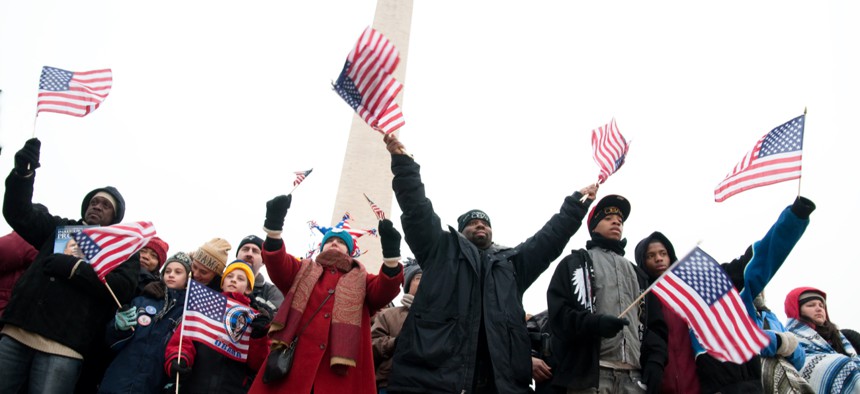
Ryan Rodrick Beiler/Shutterstock
Viewpoint: Diversity Training Isn’t ‘Anti-American Propaganda’; Trump’s Directive Is
The administration’s mandate to end such training could be summed up as “Don’t ask white people to think about race.”
As Americans prepared to honor workers over Labor Day weekend, President Trump attacked efforts to promote fairness, equity and antiracism in the workforce, directing the Office of Management and Budget to dismantle inclusion, diversity and equity programs in the federal government.
The resulting memo reveals the Trump Administration’s contempt for the truth about this country’s origins—that the enslavement of Black people was a foundational principle and that the racism inherent in slavery sadly lingers in our institutions today.
Using fear-mongering rhetoric, the administration’s memo calls workforce diversity and inclusion training “divisive, anti-American propaganda,” bemoaning efforts to acknowledge that most Americans, regardless of race, participate in structures, policies and institutions that were built upon and reinforce racism. The administration reserves particular invective for critical race theory, an analytic framework used to examine structures and laws and the ways that they maintain racial inequality and the concept of white privilege—the idea that white people benefit from their race in American society.
Unsurprisingly, the tenor of the memo suggests that white people are the victims of this alleged un-American propaganda: “employees across the Executive Branch have been required to attend trainings where they are told that ‘virtually all White people contribute to racism’ or where they are required to say that they ‘benefit from racism.’”
The Trump administration’s directive fails American workers in federal jobs in at least three respects:
1. Americans are talking about race and shutting down federal diversity training won’t stop that.
Trump’s directive (intentionally) ignores the racial realities of the present—the national outrage in response to state-sponsored violence against Black people in 2020, including the police shootings of Breonna Taylor, Tony McDade, and Jacob Blake, the murder of George Floyd and death of Daniel Prude through suffocation as well as the murder of Ahmaud Arbery by white vigilantes. Racially diverse protests of racial injustice, triggered by George Floyd’s murder in May, continued throughout the summer. Employers and major U.S. corporations are speaking out against systemic racism, pledging to address racism within their own organizations, and hiring chief diversity officers.
This is exactly the wrong time to shut down discussions of racism, diversity, and inclusion among government employees. America is talking about race. White people historically have done a poor job of understanding racism. Workplace conversations about race—intended to build trust, promote fairness and interrupt bias—are most productive when facilitated by professionals who have expertise in mediating these conversations. Diversity experts can help move conversations beyond individual fears to shared goals and values.
2. By mischaracterizing diversity, inclusion and racial justice efforts, Trump is intentionally fueling division within the federal workforce.
The president regularly—covertly and overtly—fuels division, fear and hatred between Americans, particularly regarding race. His directive shutting down diversity training is more of the same.
For example, the directive claims that diversity training teaches that there is “racism embedded” in the belief “the most qualified person should receive a job.” To the contrary, there is nothing inherently racist about hiring the best person for a job, but hiring and promotion processes can be unnecessarily biased if racial barriers remain unchecked.
The OMB memo implicitly pits Black and white federal employees against one another and ignores research showing that racially diverse workforces are more innovative and can improve financial outcomes.
3. Ending contracts with diversity professionals jeopardizes broader racial justice reforms intended to dismantle historic bias in federal employment.
Effective diversity and inclusion education for any workforce is ongoing, regularly reinforced by managers and rooted in evidence-based reforms that change personnel policies and practices. The directive to end contracts with diversity training professionals will likely disrupt comprehensive efforts toward racial justice in the federal workforce.
It also runs counter to President Obama’s Executive Order 13583, Establishing a Coordinated Government-Wide Initiative to Promote Diversity and Inclusion in the Federal Workforce. The goals of the Obama order included improving recruitment to ensure the federal government was recruiting diverse, high-performing applicants from all segments of American society; cultivating a culture that encourages collaboration, flexibility and fairness; and developing structures “to equip leaders to manage diversity, be accountable, measure results … and institutionalize a culture of inclusion.”
When done well, diversity education prepares leaders to recruit diverse talent pools, particularly among underrepresented groups, trains leaders on policies that address racial compensation disparities (the average salary of white federal government employees is $89,495, while the average salary of Black federal government employees is $77,276), and readies them to meet diversity and inclusion performance metrics. The 2011 Governmentwide Diversity and Inclusion Strategic Plan aims to do just that. It pairs policies and accountability with training to address inequities.
While diversity training alone may do little to advance racial justice in the federal workforce, Trump’s efforts to silence discussions of historic racial bias are intended to roll back diversity initiatives that promote fundamental fairness in hiring, promotion and compensation.
It’s Trump’s directive, not diversity training, that is un-American. Ending structural racism in the federal workforce as we continually strive to build a more perfect union—that’s patriotic.
Ellen Eardley is a partner at Mehri & Skalet, PLLC and co-chair of the firm’s civil rights practice.






